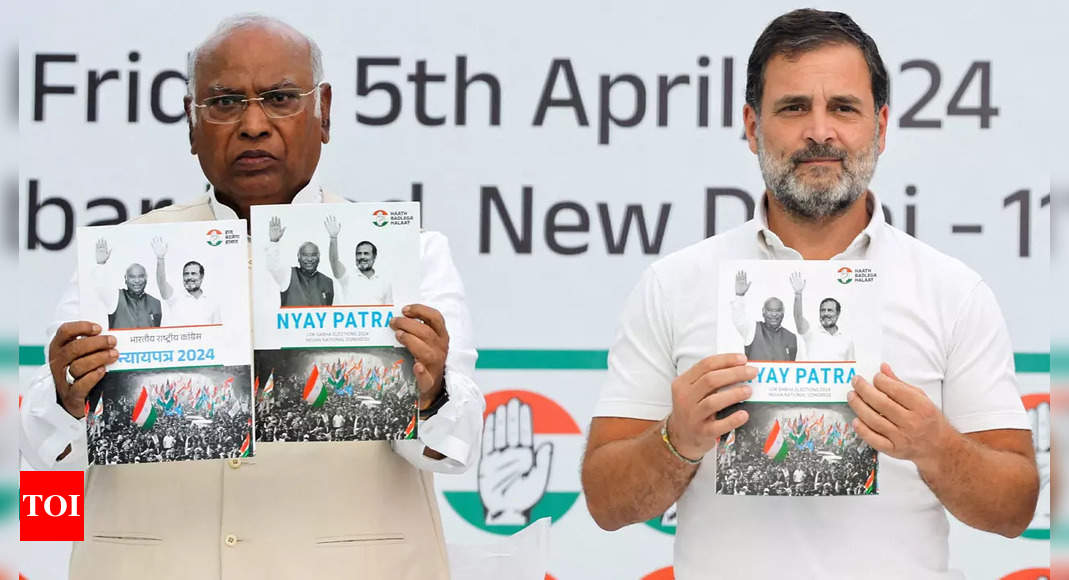
NEW DELHI: In a significant development in the poll season, both Congress and CPI (Marxist) through their manifestos for Lok Sabha elections have brought into focus the need to secure the rights of same sex couples. “After wide consultation, Congress will bring a law to recognise civil unions between couples belonging to the LGBTQIA+ community,” the party’s manifesto released on Friday states.
The Grand Old Party also talks of expanding Article 15 and 16 of the Constitution to prohibit discrimination on the grounds of disability, impairment or sexual orientation.
After a marathon hearing of the case, that stirred a national debate on the issue, the Supreme Court in its judgement in October last year had refused to grant legal recognition for queer marriages in India saying that it is a matter for the legislature to decide. However, all the judges on the bench agreed that the Union of India, will constitute a committee to examine the rights and entitlements of persons in queer union, without legal recognition of their relationship.
The assertion on civil unions by two national political parties opens the issue for debate in poll season with all eyes now on how much room other political parties like the ruling party at the Centre – the BJP will make for the community’s demands in their poll promises. The central govt in its counter-affidavit filed in the Supreme Court had opposed the bunch of petitions which sought legal recognition for same-sex marriage.
The CPI (M) in its manifesto released on Thursday too spoke of these issues. The party spoke of “giving legal recognition and protection to same sex couples similar to marriage – “civil union”, “same-sex-partnerships”, legislations on similar lines as Special Marriage Act, 1954 so that the partner can be listed as dependent, for inheritance, alimony in case of divorce.”
In fact, CPI (M) also talks of a comprehensive anti-discriminatory bill covering LGBTQ+; reservation in education institutions; and ensuring crimes against LGBTQ+ persons are treated on par with crimes against non-LGBTQ+ persons.
For the people from the LGBTQIA+ community, while the CPM and Congress manifestos come as that much needed opening for a debate on the important role the elected representatives can play in upholding the rights of the community they caution that these commitments need to go beyond lip service.
Speaking to TOI, Transgender rights activist and one of the representatives from the community on the National Council for Transgender Persons, Abheena Aher asserted, “First of all any political party ruling or opposition who ever is coming forward in support of the ‘LGBTI inclusion and human rights’ agenda is welcome and appreciated by the trans and other LGB community. We must treat everyone equally and secure human rights. However, we as a sexual minority cannot be just lured just for the political votes!”
“We are now aiming for the implementation Trangender act and policies on the ground. We welcome everyone to come forward and treat LGBTI community with love, respect and dignity. It’s high time we have to talk about civil rights of the sexual minorities. Yes, we need to be brought on the table for discussion! Yes, we need to be part of the civil rights agenda! And definitely Yes, that we all must accept different sexualities and gender expressions at an immediate level! Now we look forward to not just promises but turned into practice on the ground,” Aher added.
Transgender rights activist, Sowmya Gupta from the National Network of Transgender Persons said, “It is a good thing that political parties are thinking about us but then the fact is that ground realities have to change like stepping up enrollment of transgender persons as voters. It has been five years since the law to protect the rights of transgender persons was enacted but on ground much needs to be done. Political parties need to walk the talk for anything to change significantly on ground.” To drive home her point, she highlighted that on April 14 it will be 10 years since the landmark judgement in the NALSA versus union of India case that recognised transgenders to be the third gender among other significant directions to the government. “Those implementing policies – the government and politicians have to simplify the process to make inclusion real. Just talking about legal sanction to civil unions will not help,” Gupts emphasised.



